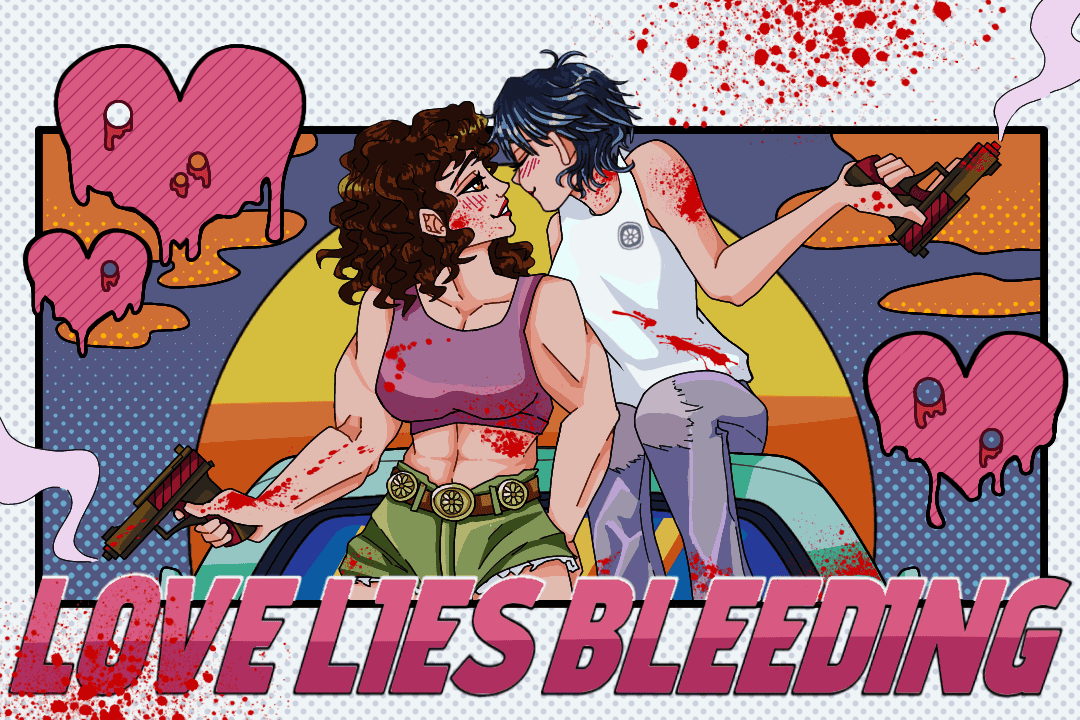Content Warning: This article mentions substance usage, violence, and murder.
This review contains spoilers.
Set in 1989, Love Lies Bleeding is an erotic neo-noir crime thriller film directed and co-written by Rose Glass. The film follows the explosive relationship between Lou (Kirsten Stewart), a scruffy gym manager, and Jackie (Katy O’Brian), a hunky hitchhiking athlete stopping by in a small town in New Mexico on her way to a bodybuilding competition in Las Vegas.
The two meet at Lou’s gym, where Jackie hesitantly accepts Lou’s offer of steroids. They go back to Lou’s place, and one steamy montage later, Jackie moves in with Lou.
Love Lies Bleeding features impressive performances from the two leads. Stewart easily won me over with her intensity and vulnerability, while O’Brian came across as simultaneously lovable and terrifying without being overshadowed by her co-star’s charm. They both manage to be vulnerable and sympathetic and their performances balanced with their incredible acts of violence.
The situation starts to deteriorate when Jackie and Lou meet up with Lou’s impressionable sister Beth (Jena Malone) and her violently abusive husband JJ (Dave Franco). Lou feels responsible for protecting her sister and, in a moment of anger, tells Jackie she wishes JJ were dead. The next day, when Beth is admitted to the hospital for injuries caused by her husband, Jackie pays JJ a visit. In a display of brute strength and steroid-enhanced rage, she beats him to a pulp and repeatedly smashes his head against the coffee table, — killing him.
JJ’s death is the first of many extremely violent scenes that follow Jackie and Lou as they navigate their messy situation. Through murdering JJ, Jackie saves Beth from her abusive husband and frees Lou from being stuck in her hometown to look after her sister. However, by helping Lou frame JJ’s death on her crime lord father, Jackie launches a complicated mess with the local authorities, the FBI, and Lou’s vengeful father, Lou Sr (Ed Harris).
Between the horror and gore, the audience is also treated to closeups of Jackie’s bulging muscles, which visibly grow and stretch. Where the long arm of the law fails, Jackie provides swift fists of righteous anger. Her muscles function symbolically, suggesting that women and other queer bodies may reclaim power from the men who control them by speaking men’s language of violence. For the rest of the movie, Jackie erratically struggles through some combination of love-induced terror and steroid-induced psychosis.
Despite Jackie’s behaviour, Lou meets her where she is at every step of the way, which is where Love Lies Bleeding succeeds. The couple idealizes each other to the extreme — in some ways mirroring Beth and JJ’s marriage — despite Lou’s frustration with her sister’s situation. There are moments when Lou looks at Jackie with real fear in her eyes, but her love for Jackie leaves Lou with no choice but to follow her into the vortex of crime, covering up her lover’s carnage as they go.
Glass explained in an interview with CBC that the movie aims to show that “[Queer women] can be awful people as well.” Love Lies Bleeding does not fall into the trope of portraying sapphic relationships as utopic safe havens from patriarchal violence, but instead provides a nuanced portrayal of sapphic love. Though Lou and Jackie may idealize each other, the characters are portrayed as they are: messy, fallible, and reaching extreme lengths to keep their feeble connection alive.
The ending reads as a surrealist revenge fantasy reminiscent of the football field massacre at the end of Emma Seligman’s comedy film Bottoms (2023).
After surviving a gunshot wound from her father, Lou has no way to escape. This is when Jackie comes to her rescue. In the ultimate display of roid rage, Jackie hulks out of her tank top, grows to triple her size, and pins Lou Sr down.
Though Jackie gets Lou in a lot of trouble, she also ultimately sets her free — at least, that’s how Lou sees it as she gazes up at Jackie’s giant form looming over her father. The couple then escapes, now both as giants, running through clouds and stars.
Of course, they don’t get away that easily. There is a lingering sense that their actions will continue to haunt them. In their getaway car, while heading to dispose of the body of Lou’s ex — who they tried to kill amid the chaos — Lou notices the body starting to move.
In the film’s final scene, Lou sits in the back of her pickup truck and chokes her ex to death before dragging her body out into the desert while Jackie sleeps in the passenger seat, oblivious. Lou and Jackie have both become monsters — through their giant physical form and their actions. Their monstrosity forces them into the margins of society, but also serves as an opening; an opportunity for the two to operate outside of societal norms.
The chilling final image suggests that the couple’s dynamic will persist well after they leave the audience behind and ride off into the sunset. Lou will keep cleaning the messes Jackie leaves in her wake as long as they are together. This is the price she pays to keep their love alive.



No comments to display.